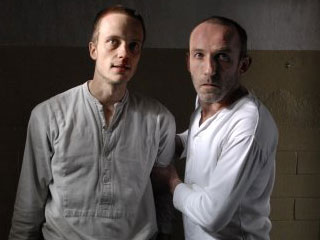The Counterfeiters
by George Sax
Watch the trailer for "The Counterfeiters"
If we didn’t know that Salomon Sorowitsch, the main character in Stefan Ruzowitzky’s The Counterfeiters, was based on an actual person, we could easily accept him as a complete invention. Sorowitsch, a master forger non-pareil, is such a clever, accomplished, supremely effective operator in the midst of virtually unimaginable difficulties as a prisoner in a Nazi concentration camp, that he might otherwise seem to inhabit a dark realm of the imagination.
But Sorowitsch’s remarkable survival skills are the motor for Austrian writer-director Ruzowitzky’s tense Holocaust-era drama, this year’s Oscar winner for Best Foreign Language Film. They’re the means Ruzowitzky leverages to give his film an important moral dimension. The Counterfeiters poses the excruciating question of whether and when survival against the terrifying threat of fascist brutality is justifiable, or even noble, especially if it requires collaboration with the immense evil imperiling millions.
Like his historical prototype, Salomon Smolianoff, Sorowitsch (engrossingly played by Austrian TV actor Karl Marcovics) is a Russo-German Jew and a prince of forgers in mid-1930s Berlin, as well as a genially cynical bon vivant in the city’s demimonde. Despite the tightening encirclement of anti-Jewish National Socialist restrictions and attacks, Sorowitsch remains optimistic. The problem with the Jews, he tells a fellow night-clubber, is their failure to adapt, as if he was speaking of an alien race.
But before he can execute his plan to escape to Argentina with a case of counterfeit marks, he is arrested and ends up in Mauthausen, a work camp of the doomed. After keeping his head above water by guts, guile, and his sentimentally heroic portraits of the camp’s S.S. personnel, he is sent in 1944 to Sachsenhausen, another camp, by the man who arrested him, Friedrich Herzog (Devid Strieson), now an S.S. officer in charge of a crash program to undermine Allied economies by flooding them with bogus pounds sterling and dollars.
Sorowitsch is one of a number of valuably skilled technicians and artisans gathered in a special, isolated camp section to live and work in conditions starkly different than those of the wretched prisoners beyond these walls, whose suffering and deaths can sometimes be heard.

The chief challenge to conscience Ruzowitzky sets up comes in the person of a printer named Burger (August Diehl), a communist whose reservations about cooperating impel him to sabotage. Burger, too, is from real life. He still lives in Prague and has published a memoir that Ruzowitzky used in fashioning his screenplay.
He and Sorowitsch are made to represent the opposing yet mutually entangled positions about resistance and self-saving accommodation. Is it heroic to survive against the odds, or to throw a wrench into the monstrous Nazi machinery whenever possible?
Sorowitsch is supposedly the consummate and self-avowed survivalist adapter, but it becomes increasingly clear that he is something else, too. And Diehl, the courageously principled leftist, may be motivated by guilt and sorrow.
Ruzowitzky has managed to sustain his premise and conflicts with a combination of technical and narrative skills. He and his cinematographer, Benedict Neunfels, use a probing handheld camera to bring an audience down into the plight and perspective of the prisoners, sometimes pulling back for emphasis and scene framing.
There are at least a couple of historical inconsistencies. Early on, for example, a rather pretty lad of Sorowitsch’s acquaintance brags to him that he has been taken by a Nazi lover to a party meeting, a dramatic unlikelihood given Hitler’s extermination of gay S.A. leader Ernst Rohm and his gay (and straight) comrades two years earlier (gothically depicted in Luchio Visconti’s 1969 film The Damned).
But it isn’t these that most get in the way of what Ruzowitzky is trying to accomplish with his question posing. Sorowitsch is increasingly revealed as someone who can’t live up to his own survivalist’s ethos. Time and again, he intervenes, or remains quiet, to save another prisoner, even at peril to his own life. He maintains a running effort to protect a delicate, artistic youth from Odessa, eliciting an affectionate chiding from the boy: “You certainly know how to raise children.”
Sorowitsch, it seems, is a thief with honor, and a capacity for tenderness that might have undone Smolionoff, who lived to pursue a career in art forgery into the 1960s. Despite trying to game his way out of an artistic and ethical challenge by softening his wily protagonist, Ruzowitzky’s achievement is much more than a suspenseful prison camp drama. The Counterfeiters is a somberly disturbing, if flawed, representation of a world of hellish choices.
|
Issue Navigation> Issue Index > v7n13: Brave New World (3/27/08) > The Counterfeiters This Week's Issue • Artvoice Daily • Artvoice TV • Events Calendar • Classifieds |









 Current Issue
Current Issue